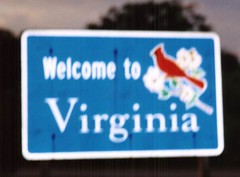"Don't hate, participate..." and disconnected public officials (Alaska and Virginia edition)
AP reports in the article "Alaska Makes Plans to Counter Impression That It's Greedy," that:
...lately, Alaska is worried that the rest of America sees it as the Freeloading Frontier. Gov. Frank H. Murkowski says it is time for an image makeover. He wants the state to hire a public relations firm to change the perception of Alaska and its people as greedy for federal money and too willing to plunder the environment for profit.
Ultimately, Mr. Murkowski, a Republican, wants to sway public opinion in favor of opening the Arctic National Wildlife Refuge to oil drilling. Most Alaska politicians favor drilling in the refuge, which would fill the state's treasury as the trans-Alaska oil pipeline has done for decades. But environmentalists have fought back for a quarter-century, and in December the state was thwarted again in Congress.
Alaska also suffered the mocking of late-night comedians and pundits a few months ago during the furor over $450 million that Congress appropriated for two "Bridges to Nowhere" that became symbols of waste. In reaction, Mr. Murkowski announced in his State of the State address in January a plan to counter misperceptions about Alaska.
Alaska is one of the top recipients of federal largesse. In 2003, the latest year for which figures are available, Alaska received $1.89 in federal spending for every $1 the state paid in taxes to Washington, according to the Tax Foundation, a nonpartisan research organization. The state ranked second, behind New Mexico. Alaska ranked highest in per-capita money received from the federal government that year, the group reported.
At the same time, Alaska residents pay no state income tax, and only a few cities have a sales tax. In fact, every year, practically every man, woman and child in Alaska receives a share of the state's oil wealth just for living here. Last year's check was for $845.76.

Joel Connely, a columnist for the Seattle Post-Intelligencer countered Gov. Murkowski's speech with this piece, "Alaska's politicians to blame for image." From the piece:
If you buy the line taken in Alaska Gov. Frank Murkowski's recent State of the State speech, the answer to flak over "bridges to nowhere" is for the state to go out and hire flacks. An alternative might be put on the table: Alaska politicians could stop fleecing taxpayers in the "lower 48" states, and cease crude threats and clumsy retaliatory measures -- particularly against their colleagues from this state.
Not likely. The latest act of vengeance is a bill in the Alaska Legislature to take the Alaska ferry terminal away from Bellingham. It would presumably be punishment for Washington lawmakers' refusal to go along with December's barely thwarted backdoor maneuver in Congress to open the Arctic National Wildlife Refuge to oil drilling.
If Murkowski does go for the public relations option -- he has long-standing ties to the Rockey Hill & Knowlton firm in Seattle -- the image makers' challenge will be formidable. How, for instance, do you justify subsidized logging of temperate rain forests in southeast Alaska's Tongass National Forest?
Sounds like the problem of having a bad client, say like a Haitian dictator, or Saddam Hussein before the Iraqi War. Too bad Jack Abramoff is otherwise unavailable.
And Sunday's Washington Post reports, "Tysons Forums Sowing Skepticism," that rather than have elected and appointed local government officials conduct public planning processes, that Fairfax County has hired consultants to survey public opinion, independent of any county agency involvement at the public forums. From the article:
County officials say the consultant-led focus groups represent a genuine attempt to include public input in decisions about this transformation. But many residents say the sessions can be a jarring and confusing twist on representative government, leaving them feeling powerless and patronized when it comes to the issue that matters most to them.
Many have had little prior interaction with their local government and say they come to the meetings driven by worry and hoping to learn more about the changes to their community. Instead of meeting with their elected officials or county staff, though, residents are presented with consultants armed with PowerPoint, pretzels and butter cookies.
The consultants running the meetings immediately make it clear that they are there not to provide information, but simply to "capture" residents' input and then report it to a task force that will make recommendations to the county's elected leaders. Or, as the consultant leading most of the Tysons sessions puts it: "What we're really here to do is talk about your values and concerns about the future."
Residents appreciate the chance to state their views, but many are doubtful that their opinions will matter after being filtered through both the consultants and a task force on their way to county officials. Skeptics say the time-consuming outreach gives the appearance that the public has played a role in decisions that were in fact foretold from above.
This is no different that what I called the "tyranny of process over content and quality" in a blog entry last week about the DC Public Library planning process and their use of the public participation organization "America Speaks," to facilitate, guide, and circumscribe the ability of citizens to participate in the planning process.
Similarly, I am uncomfortable with government agencies using their websites to sell particular policy positions, without providing access to alternative opinions, especially when these promotions are in advance of public votes on such matters. The use of the "award-winning" DC Government website in this fashion to promote the baseball stadium is one such instance.
"The people need to unite or we will be defeated" by the patina of public participation that is not grounded in the public/body politic.

Index Keywords: civic-engagement



0 Comments:
Post a Comment
<< Home